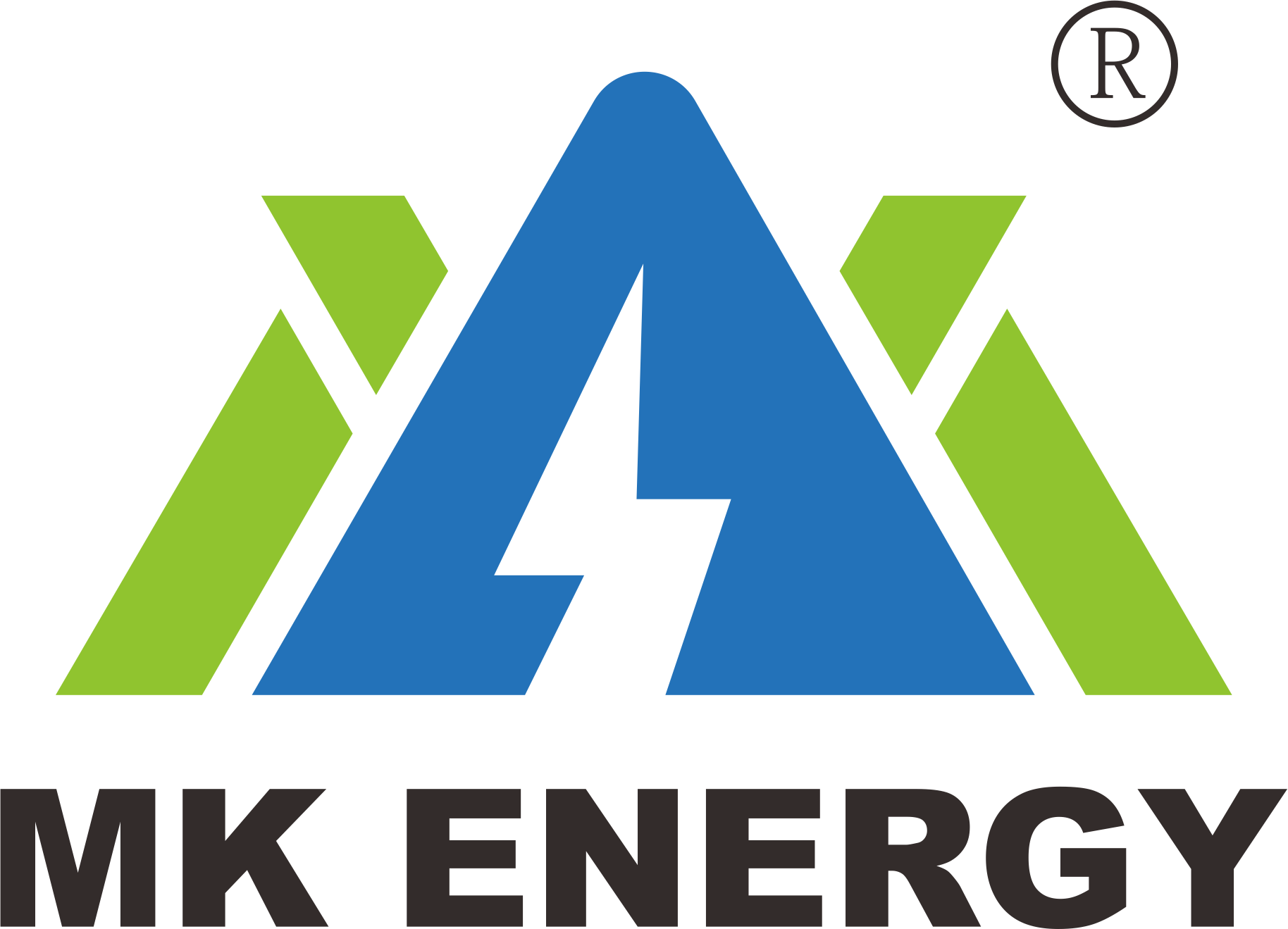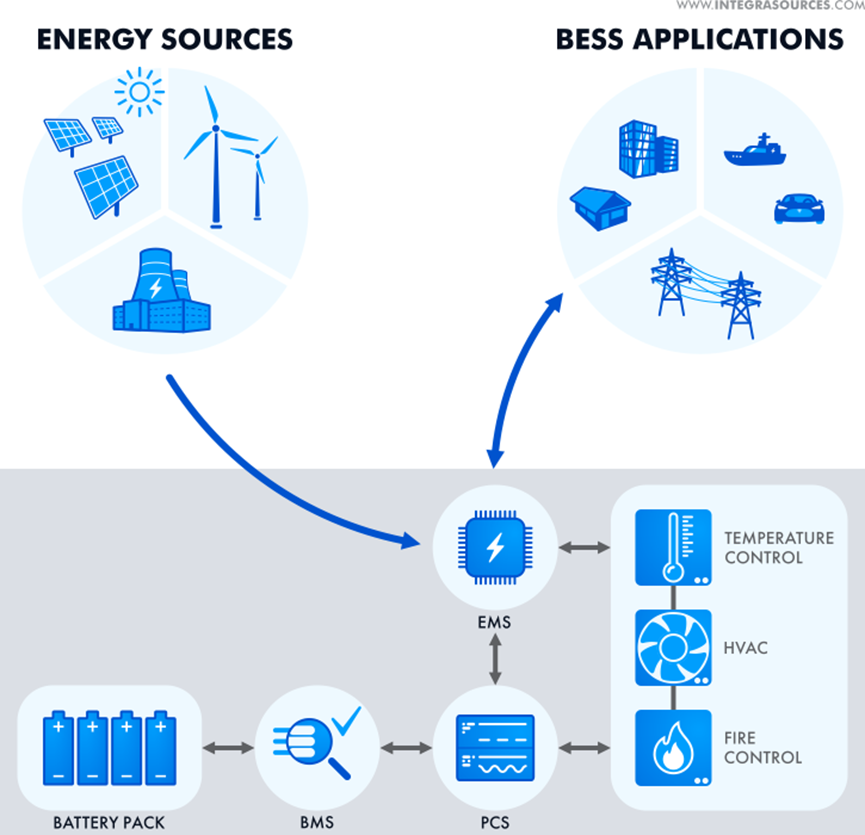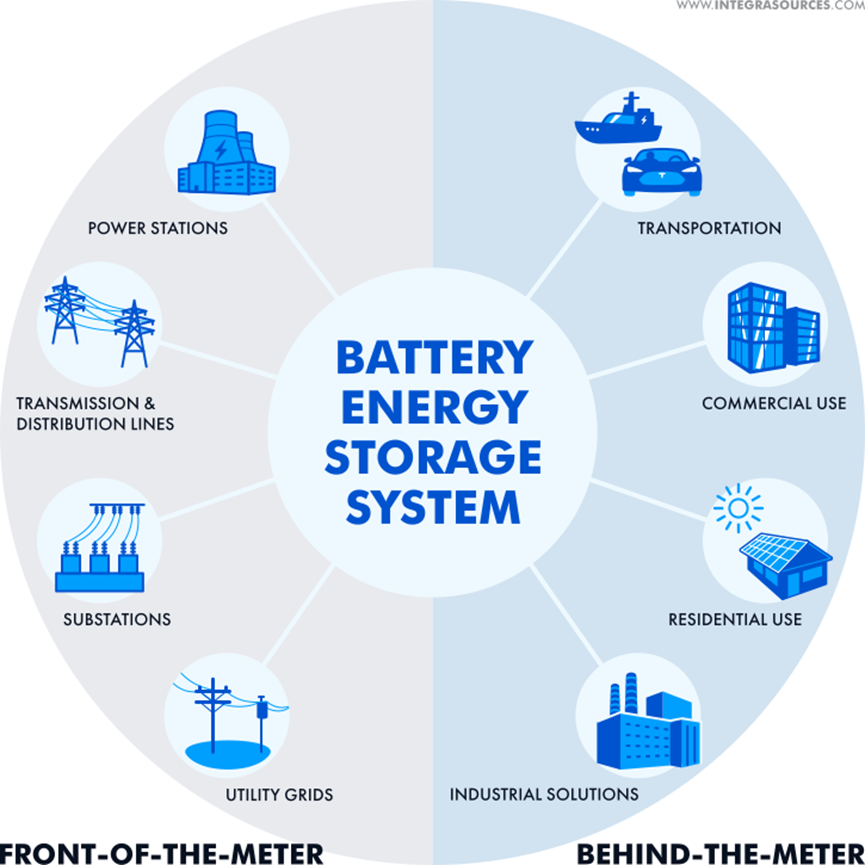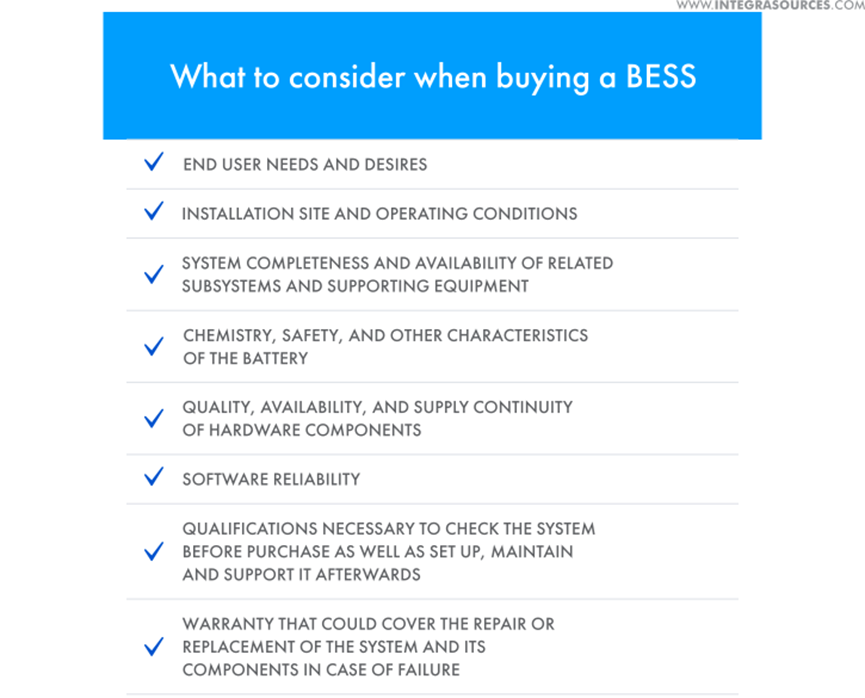Battery energy storage systems (BESS) play an extremely important role in energy management, storing excess electricity and maintaining a stable supply of power. The global battery energy storage system market is booming and is expected to reach approximately US$9.2 billion by 2026. Facing the booming battery energy storage system market, MK continues to provide advanced energy solutions to meet various new needs in the industry.
What is BESS?
BESS is an energy storage system that captures, accumulates energy from different energy sources and stores it in rechargeable batteries for future use. If electricity is needed, electrochemical energy is discharged from the battery and supplied to homes, industrial and commercial facilities, etc. Today, large-scale BESSs are already operating around the world, including the United States, Australia, the United Kingdom, Japan, China and many other countries.
It is a composite system, including hardware and elementary and advanced software. Major BESS include:
Battery system: Contains individual cells that convert chemical energy into electrical energy. The cells are arranged in modules, which form a battery pack.
Battery Management System (BMS): BMS is used to ensure the safety of the battery system. It monitors the status of battery cells, measures their parameters and status, and protects batteries from fire and other hazards.
Inverter or Converter Storage (PCS): Converts the direct current (DC) produced by the battery into alternating current (AC) for use by the facility. The inverter of the battery energy storage system allows the flow of energy in both directions, allowing charging and discharging.
Energy Management System (EMS): Responsible for monitoring and controlling the flow of energy within the battery energy storage system. EMS coordinates the work of BMS, PCS and other components of BESS. By collecting and analyzing energy data, EMS can efficiently manage multi-energy access to the system.
Depending on its function and operating conditions, BESS also includes a range of safety systems such as fire control systems, smoke detectors, temperature control systems, cooling, heating, ventilation and air conditioning systems. The safety system itself has a monitoring and control unit that provides the BESS with the conditions required for safe operation by monitoring its parameters and responding to emergencies.
Types of BESS
The classification of BESS varies depending on the electrochemistry or battery technology used.
Lithium Ion Battery
According to a report released by the U.S. Energy Information Administration (EIA), more than 90% of large-scale battery energy storage systems in the United States are powered by lithium-ion batteries, and the current overall global statistics are basically the same.
Lithium-ion battery chemistries include lithium cobalt oxide, lithium manganese oxide, lithium iron phosphate, lithium nickel manganese cobalt oxide (NMC), and others. Lithium-ion batteries have many advantages that make them one of the leading energy storage technologies. The global lithium-ion battery market is expected to double by 2026. It is lightweight and compact, has high capacity and energy density, low maintenance costs and long service life.
In addition, lithium-ion batteries are easy to charge quickly and have low self-discharge rates. Disadvantages of this battery technology include high cost, flammability, intolerance to extreme temperatures, and the ability to overcharge and overdischarge.
Lead-acid (PbA) battery
Lead-acid batteries are one of the oldest battery technologies and are the cheapest and most common solution used in automobiles, industrial applications and power storage systems. Lead-acid batteries are highly recyclable and operate effectively in both high and low temperatures.
Sealed valve-regulated lead-acid (VRLA) batteries are more suitable for power storage solutions than their older counterparts, flooded lead-acid (FLA) batteries, due to their longer life, higher capacity and easier maintenance. Slow charging, heavy weight and low energy density are the main drawbacks of this battery technology.
The necessity of buying BESS
There are several benefits to choosing batteries for energy storage. First, there are no restrictions on location for battery energy storage – there is no need to provide huge water tanks or underground gas storage tanks.
Due to its high availability and flexibility, BESS can be well matched to applications with different power and storage capacities. In addition, modern battery technology tends to be lightweight, paying more and more attention to cost-effectiveness, safety and environmental protection.
Below are some application examples of battery energy storage systems and the basic problems it can solve.
Energy demand management: BESS helps balance loads between peak and off-peak times. Battery energy storage solutions enable users to save money on their electricity bills by storing energy when demand is low and discharging it during peak periods.
Backup power: In the event of a grid failure, BESS can provide backup power until power is fully restored. By operating as an uninterruptible power supply (UPS), commercial battery energy storage solutions can save time and money by eliminating downtime.
Black start capability: After a power outage, the black start capability based on the battery energy storage system can be used to restore power generation, thereby replacing the diesel or natural gas generators used in power plants. BESS’s fast response time helps get the system back up and running in the shortest possible time.
Frequency Control: If the amount of electricity generated does not match the actual power demand, the frequency may go above or below its rated value. These differences can result in temporary grid disconnections, power failures or power outages. BESS can respond immediately to power outages, provide sub-second frequency speed response, and stabilize the power grid.
Renewable energy integration: Combining battery energy storage systems with intermittent renewable energy sources provides cheap, continuous power for on-grid, off-grid and hybrid systems. Government subsidies and reduced tax rates have also resulted in widespread support and incentives for renewable energy-storage solutions.
Factors to consider when purchasing BESS
The global battery energy storage market is well supplied. As battery costs fall, off-the-shelf battery energy storage systems become more affordable for consumers. When choosing a battery energy storage system, in addition to price, we should also consider the following factors:
The integrity of the system and the availability of related subsystems and supporting equipment, the chemical safety and other characteristics of the battery, the quality, availability and continuity of supply of hardware components, and the reliability of the software, etc. Battery management system (BMS) software is responsible for charging, discharging and battery safety, and plays an important role in the overall performance of the battery energy storage system.
Buying a ready-made BESS can save you time, especially if you need a plug-and-play solution with no specific consumption requirements. But off-the-shelf systems can have unreasonably priced, poor-quality pre-installed software and other unnecessary features that add to costs. Tailor-made BESS solutions can meet the exact needs of potential customers.
Finally, product certification is something you need to consider. In addition to international standards such as IEC, ISO, IEEE and UL, BESS will most likely need to meet each country’s specific national standards and certification requirements. The BESS vendors we select must be well-versed in certification requirements and applicable standards, which helps mitigate risk in system design and deliver high-quality products to end users on time and within budget.
Recap
BESS is a multi-component energy storage system capable of storing varying amounts of electrochemical energy and used for application purposes including peak reduction, energy harvesting or black start. BESS manufacturers offer a rich selection of various storage capacities suitable for any application. Applications and budgets.
MK provides customized needs for various storage capacities and designs the system according to the customer’s usage and budget. If you want to purchase a battery energy storage system or need professional energy storage advice, please contact us at sales@mkenergycn.com.





